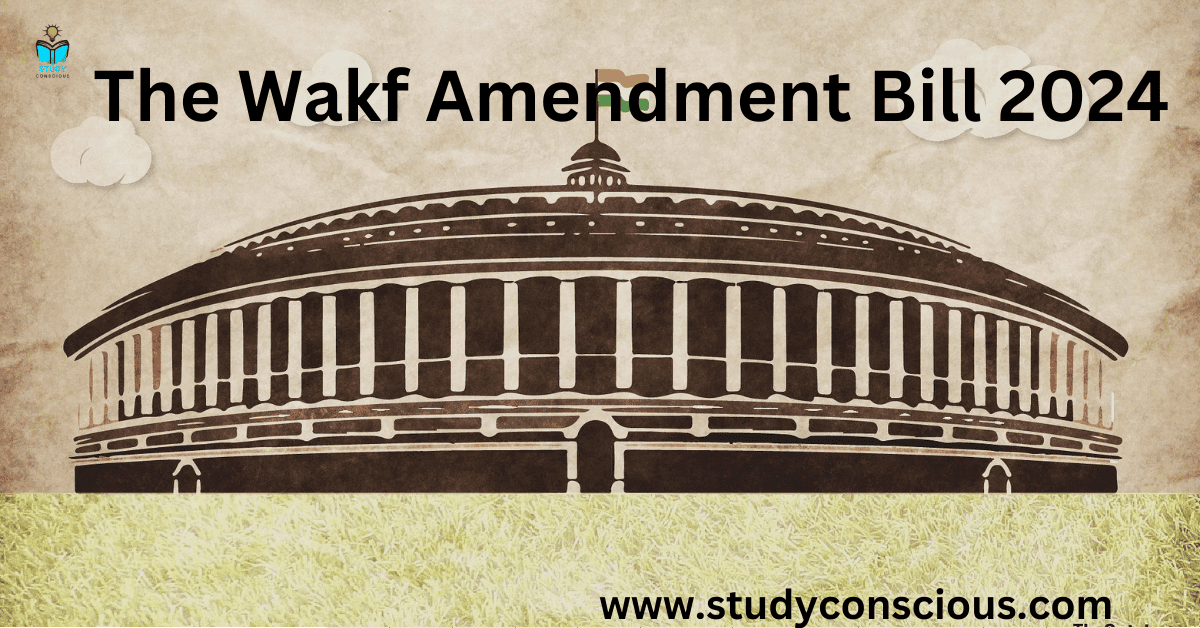The term Wakf is popularly used now a days after the BJP government has shared the post on X (twitter). The government of India has taken their steps forward to make “the wakf amendment bill 2024“ after making some significant changes in the Wakf act 1995. Before going through the details of the bill, let us first understand the meaning of Wakf. The Wakf (Amendment) Bill 2024
A wakf is a religious property used for charitable purpose and “wakif” is a person who dedicates or donates his property for such charitable purpose. Moreover “Wakf means the permanent dedication by a person professing the Islam, of any movable or immovable property for any purpose recognized by Muslim Law as religious or charitable.” A waqf can be either in writing or can be made by an oral presentation.
About The Wakf (Amendment bill) 2024
- Mandatory Registration of Properties: The bill requires that all waqf properties be registered with the District Collector’s office, rather than any central or state wakf council, for a formal evaluation process. This streamlines the identification of waqf lands and helps prevent encroachment and misuse.

- Lawful Ownership Requirement: A new provision mandates that only lawful property owners can establish a waqf, ensuring that no public or government land is illegally classified as waqf property
- Recognition of Government Properties: Properties already designated as government land, either before or after the enactment of the law, cannot be declared as waqf property. This change is designed to address longstanding disputes over land claims between waqf boards and government authorities.
- Representation of Women: The bill introduces mandatory representation for Muslim women on both the Central Waqf Council and state waqf boards.
- Revised Dispute Resolution: a move is intended to be more transparent about the process.
The Wakf act 1995
The Waqf Act, 1995 is an Indian legislation that provides for the administration, management, and supervision of waqf properties. Under this act any property once dedicated as Wakf cannot be taken back or used for any other purposes, doing so by any person may lead to punishment.
Here are some important key features of the Waqf Act, 1995:
- The Act mandates the establishment of a Central Waqf Council, an advisory body under the Government of India and is responsible for advising the government on matters related to waqf properties and monitoring the activities of the State Waqf Boards.
- Each state is required to establish a State Waqf Board. These boards are responsible for overseeing the administration of waqf properties within the state. The Waqf Boards manage the affairs of these properties, ensure their proper use, and prevent illegal transfers.
- The Act makes it compulsory to register waqf properties with the State Waqf Board. Details like the location, income, purpose, and the name of the mutawalli (manager/trustee) are required for registration.
- A regular survey of waqf properties is mandated by the Act, conducted by the state governments to maintain an updated record of all waqf assets.
- The Act provides measures to prevent the encroachment of waqf properties. It has provisions for legal action to reclaim waqf land that has been illegally occupied or transferred.
- The Act establishes Waqf Tribunals to resolve disputes related to waqf properties. These tribunals have exclusive jurisdiction in matters related to waqf and disputes concerning the administration of waqf properties.
- Penalties are prescribed for violations of the Act, such as failure to register a waqf property or mismanagement by the mutawalli.
- Over the years, the Act has been amended to improve the administration of waqf properties. The Waqf (Amendment) Act, 2013 introduced stricter penalties and measures to curb encroachments and improve transparency in the management of waqf properties.
Conclusion
There is a much controversy all around due to the new “wakf amendment bill”, passed by the Modi government. There are some people who are in favour of the bill and some are still in opposition to it. One should go through the details and significant changes made in the amendment, should consider the ground of such changes before coming to any conclusion of











